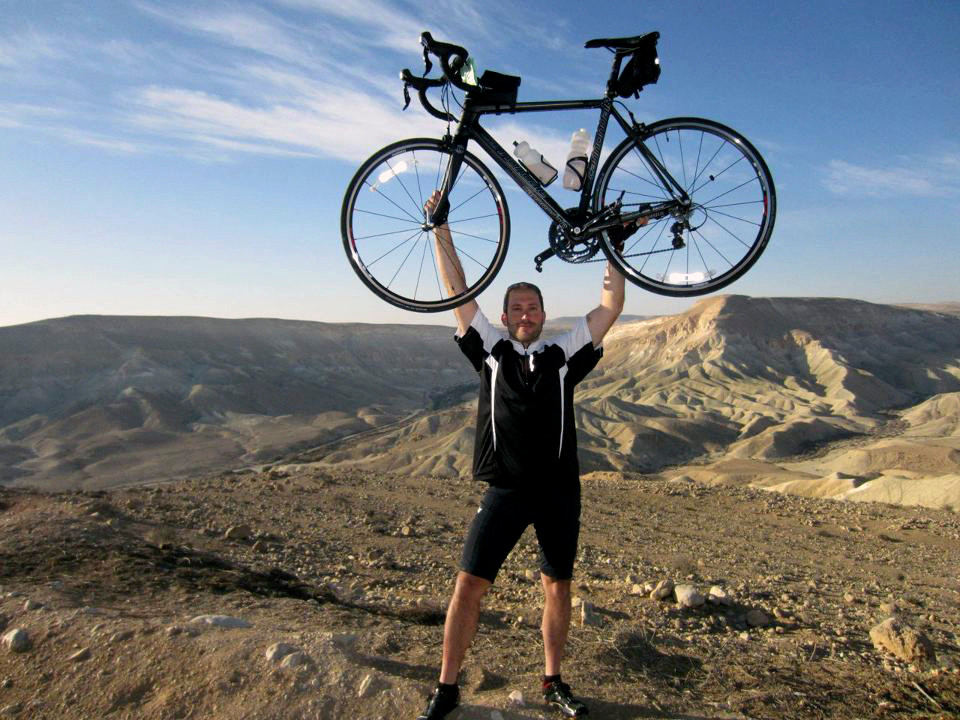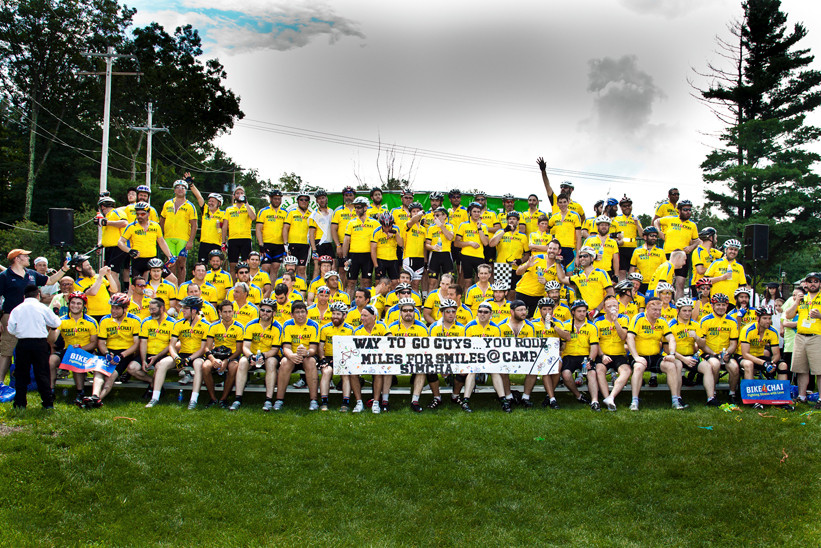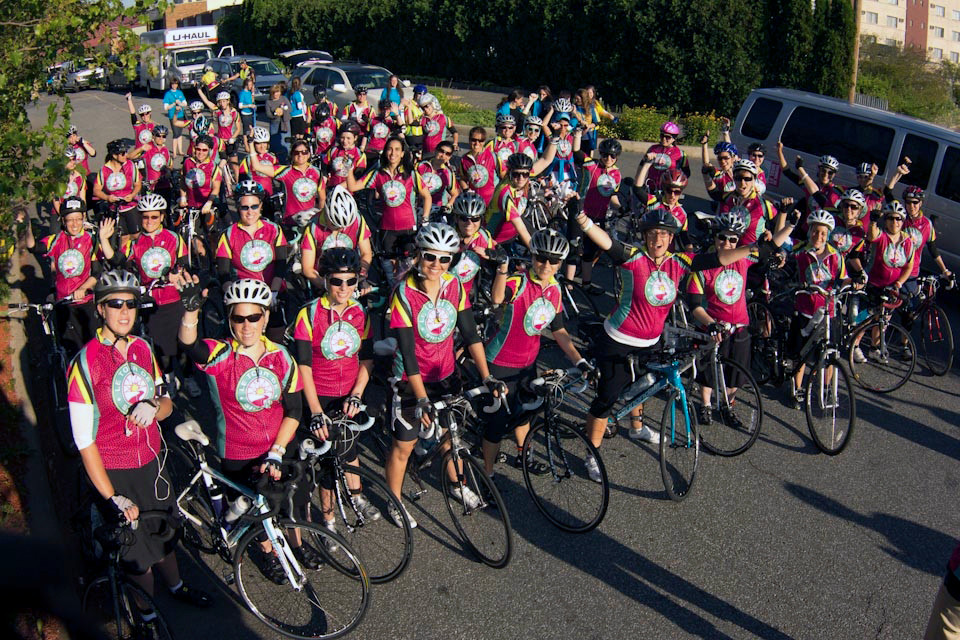Bike4Chai: The world’s greatest finish line
Muscle, sheer drive, rigorous training, stamina and the thrill of the course are coming together again this August 8th and 9th for the Third Annual Bike4Chai two day ride from the Jersey Shore into the cheering, appreciative crowd of campers at Camp Simcha Special in Glen Spey, New York.
This all male trek requires riders to bring in a minimum donation of $3,600 to join the group and cover a maximum distance of 175 miles over the two days of the meet. Many of the signed up 211 bikers have already raised more than that, with the total to date of over $1,150,000, topping Chai Lifeline’s goal for this year of $1,000,000.
“They’re coming to the world’s greatest finish line,” exulted Yoel Margolese, the event coordinator for Chai Lifeline for this ride. “It’s indescribable. They come back every year. Whether you’re the strongest or the weakest, once you come into camp, you can’t not come back. You put in all that sweat and you see these kids; grown men are crying. The kids come in with them and ride with them. It’s a whole celebration that goes on. It’s phenomenal. You see how and what it went towards; it’s very real, it’s the truest thing.”
The Tour de Simcha, a similar event but only for women, was held on July 2nd for the first time. Each rider had to raise a minimum of $1800 and be able to bike a minimum of 20 miles of the 62-mile route for the one-day ride. They stayed over night in a hotel, had rest stops every 12 miles, with medical and mechanical support, and regrouped a mile and a half before the grand entrance to the camp. Over $135,000 was raised by the 54 ladies in the group. “The event was so phenomenal,” said Margolese, “it took off with no advertising, just word of mouth.”
Raising money with extreme biking is a strong motivator for three Five Towns riders, who took up intensive training for exercise with the added bonus of using their self competing hobby for a good cause. Azriel Ganz, a member of Congregation Aish Kodesh, motivated other members of the shul to ride and his been admiringly dubbed “the bike rebbe” by some there. “I encouraged people to get into riding in a more serious way,” he pointed out. “I gave advice on bikes to buy and equipment, where and how to ride, how to hydrate, how to eat and get enough nutrients when you ride.”
Ganz said that he started doing biathlons, running and biking in the early 1980s but “my knees gave out” so he dropped the running and retained the biking, noting that biking is easier on the knees. He said that he can only go on long rides on Sundays but davens vasikin so he can bike a few times a week on “shorter” runs, such as to Point Lookout, 27 miles. He also “trains very hard,” he said at Studio Ina, doing spinning, indoor rowing, heavy cardio, weight circuit class, training about an hour, five days a week. His wife recently rode a 25 mile ride with him.
“I do this because I love to bike,” explained Ganz. He’s done “crazy” rides in Israel, combining his love for biking and his love for Israel, but has decided to “moderate” this year by riding for Chai, noting that it’s “in between for me. For me it’s not extreme,” he stressed. “I’ve been doing 350 mile rides in five days for Allyn. I did it seven out of eight years.”
Ben Cohen, another member of Aish Kodesh, said that he always enjoyed riding but got involved in extreme biking about four years ago. He trained and rode in the Allyn ride and is entered in Bike4Chai as well this year. “It’s challenging,” he stressed, but, “how often can you take a hobby and use it to help others? Not often.”
His caveat, though is, “people don’t realize how much time and commitment is needed to train. So much time on the road; it takes away time from home.” His wife knows how much it “means to me.”
Cohen has had stitches in his arm and head. “It’s crazy when you get to the hospital and the attending knows who you are,” he said, noting that he is “accident prone,” but quoted Ganz who said that there are “two types of bikers: those who have fallen and those who will.” He trains for distance, sprints, inclines, speed, and endurance, riding a thirty mile loop in back Lawrence, getting up to “daven Netz” to get in a daily ride. He rides with a small group of men who train with South Shore Bicycle and Fitness on Sundays on the North Shore. “I’m more of an endurance rider. I like to do the things that are challenging. I’m not in competition with anyone except myself.” He tries not to ride in the evenings to avoid accidents and tries to ride with a buddy for safety. “Riding for Eretz Yisrael is a tremendous feeling, the camaraderie, everything seems up hill in many ways.” And riding for Camp Simcha, he said, “to be able to do this and do this for charity is a great thing.”
Another Bike4Chai participant, Stephen Bach, chief administration officer of the Jewish National Fund, trained initially for an Israel ride and was motivated by the fund raising commitment, feeling that he had to train to complete the ride because of friends’ donations. He has always been interested in fitness and extreme sports, focusing on martial arts. He also bikes as a family activity, planning trips incorporating a drive to an area, with his wife and two children, to an event or site seeing, such as a ride around Flushing Meadow Park and then a Met game. But the extreme riding is his domain. He recommends riding with a buddy for safety, “the more people you are the more cars see you. You get up and go out and build it up. Electronic equipment on the bike monitors your heart rate, speed, distance, cadence—how fast peddles move, like rpms on a car. As a result I lost 30 pounds and am in better shape. You build up sitting bones and you become one with the seat.”
Bach also spoke of the “emotional experience” of the finish line. “The common denominator,” he said, “is that it gives you something to train for, a goal. When you go on the ride, the adrenalin you feel before and during, being part of all these people with a common goal--it’s inspiring. It gives you an extra energy boost for the ride.”
Some of the bicyclists train on Sundays with South Shore Bicycle and Fitness of Woodmere, starting about 6:30 a.m. for 70 miles in the hilly North Shore; they push the riders to build strength for the hills on the rides and to improve. About 15 riders from Queens, Brooklyn and the Five Towns are training with them this year. Owner Justin Fuchs provides a SAG, support and gear, vehicle that follows the riders on their training, with room for four bikes and riders if they need to rest, and provides first aid, bike repair, inner tubes, pumps, water, nutrients, food, and the service is free. The shop manger, Czar, (who didn’t want to give his full name) trained the women for their ride and was the marshal for the women on that ride. “Bike4Chai is a great organization,” said Fuchs. “If we increase the riders we increase the money to the camp. We want to help as much as possible. We’re menches here, we don’t like to publicize what we do. We do it to help and don’t do it for anything else.”
Margolese arranges the logistics for Bike4Chai, from planning the route to booking the hotels and the caterer, as he said, “implementing the ideas.” He does training rides with the participants but doesn’t “actually get to ride on the ride with them because I have to make sure that everything is going smoothly.” They start early and rest every 15 miles. They are provided with proper food and fluids to facilitate their effort. “It’s a high level event,” Margolese said. “It’s a ride, not a race; the point is for the guys to have a great time and enjoy the ride.”
“I can create a route anywhere,” he said, but “it’s not going to have the same success because if they are not coming into camp it’s not the same finish line. When you see it and experience it, it’s unbelievable.”
Chai Lifeline describes this camp: Camp Simcha Special was created in 2001 to meet the medical and social needs of children and teens with disparate chronic and genetic ailments.
It is a kosher camp, Camp Simcha and Camp Simcha Special, where over 430 children, either with cancer or other chronic conditions, are treated to a full camp experience away from their hospital rooms but under medical supervision.
For more information and donations to participants go to: chailifeline.org

 55.0°,
Mostly Cloudy
55.0°,
Mostly Cloudy 









